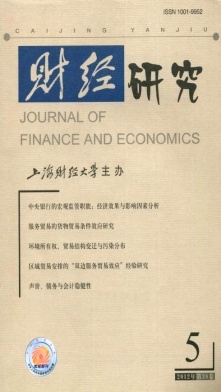声誉、债务与会计稳健性——信任视角的一项经验研究
财经研究 2012 年 第 38 卷第 05 期, 页码:124 - 134
摘要
参考文献
摘要
文章从信任的角度研究了公司声誉如何影响债务契约对会计稳健性的要求。声誉较好的债务人能够赢得债权人的信任,从而降低债务契约对会计稳健性的要求。文章运用我国上市公司的数据,采用三种声誉度量方法,实证检验发现债务水平对会计稳健性有正向影响,债务人的良好声誉能够降低这种正向影响。文章以信任概念为基础整合了声誉和会计稳健性的理论关系,拓展了财务会计研究的视野,并为声誉对法律的替代作用提供了新的经验证据。
[1]姜国华,张然.稳健性与公允价值:基于股票价格反应的规范性分析[J].会计研究,2007,(6):20-25.
[2]刘运国,吴小蒙,蒋涛.产权性质、债务融资与会计稳健性———来自中国上市公司的经验证据[J].会计研究,2010,(1):43-50.
[3]孙铮,刘风委,汪辉.债务、公司治理与会计稳健性[J].中国会计与财务研究,2005a,7(2):112-142.
[4]孙铮,刘凤委,李增泉.市场化程度、政府干预与企业债务期限结构———来自我国上市公司的经验证据[J].经济研究,2005b,(5):52-63.
[5]徐昕,沈红波.银行贷款的监督效应与盈余稳健性———来自中国上市公司的经验证据[J].金融研究,2010,(2):102-111.
[6]张维迎,柯荣住.信任及其解释:来自中国的跨省调查分析[J].经济研究,2002,(10):59-70.
[7]张维迎.法律制度的信誉基础[J].经济研究,2002,(1):3-13.
[8]张维迎.信息、信任与法律[M].北京:生活.读书.新知三联书店,2003.
[9]郑也夫.信任论[M].北京:中国广播电视出版社,2001.
[10]钟宏武.“5.12”大地震企业捐赠大众评价调查[J].中国经济周刊,2008,20:38.
[11]Ahmed A,Billings B,Morton R,et al.The role of accounting conservatism in mitiga-ting bondholder-shareholder conflicts over dividend policy and in reducing debtcosts[J].The Accounting Review,2002,77(4):867-890.
[12]Basu S.The conservatism principle and the asymmetric timeliness of earnings[J].Jour-nal of Accounting and Economics,1997,24:3-37.
[13]Brammer S,Millington A.Corporate reputation and philanthropy:An empirical analy-sis[J].Journal of Business Ethics,2005,61(1):29-44.
[14]Fombrun C,Riel C.The reputational landscape[J].Corporate Reputation Review,1997,1(1-2):5-13.
[15]Fombrun C,Shanley M.What’s in a name?Reputation building and corporatestrategy[J].Academy of Management Journal,1990,33(2):233-258.
[16]Gotsi M,Wilson A.Corporate reputation:Seeking a definition[J].Corporate Commu-nications:An International Journal,2001,6(1):24-30.
[17]Milbourn T.CEO reputation and stock-based compensation[J].Journal of FinancialEconomics,2003,68:233-262.
[18]Sztompka P.Trust:A sociological theory[M].Cambridge:Cambridge UniversityPress,1999.
[19]Tadelis S.What’s in a name?Reputation as a tradeable asset[J].American EconomicReview,1999,89(3):548-563.
[20]Turban D,Greening D.Corporate social performance and organizational attractivenessto prospective employees[J].Academy of Management Journal,1997,40(3):658-672.
[21]Watts R.Conservation in accounting partⅠ:Explanations and implication[J].Ac-counting Horizons,2003,17(3):207-221.
[22]Zhang J.The contracting benefits of accounting conservatism to lenders andborrowers[J].Journal of Accounting and Economics,2008,45(1):27-54.
[23]Zucker L.Production of trust:Institutional sources of economic structure,1840-1920[J].Research in Organizational Behavior,1986,8:53-111.
[2]刘运国,吴小蒙,蒋涛.产权性质、债务融资与会计稳健性———来自中国上市公司的经验证据[J].会计研究,2010,(1):43-50.
[3]孙铮,刘风委,汪辉.债务、公司治理与会计稳健性[J].中国会计与财务研究,2005a,7(2):112-142.
[4]孙铮,刘凤委,李增泉.市场化程度、政府干预与企业债务期限结构———来自我国上市公司的经验证据[J].经济研究,2005b,(5):52-63.
[5]徐昕,沈红波.银行贷款的监督效应与盈余稳健性———来自中国上市公司的经验证据[J].金融研究,2010,(2):102-111.
[6]张维迎,柯荣住.信任及其解释:来自中国的跨省调查分析[J].经济研究,2002,(10):59-70.
[7]张维迎.法律制度的信誉基础[J].经济研究,2002,(1):3-13.
[8]张维迎.信息、信任与法律[M].北京:生活.读书.新知三联书店,2003.
[9]郑也夫.信任论[M].北京:中国广播电视出版社,2001.
[10]钟宏武.“5.12”大地震企业捐赠大众评价调查[J].中国经济周刊,2008,20:38.
[11]Ahmed A,Billings B,Morton R,et al.The role of accounting conservatism in mitiga-ting bondholder-shareholder conflicts over dividend policy and in reducing debtcosts[J].The Accounting Review,2002,77(4):867-890.
[12]Basu S.The conservatism principle and the asymmetric timeliness of earnings[J].Jour-nal of Accounting and Economics,1997,24:3-37.
[13]Brammer S,Millington A.Corporate reputation and philanthropy:An empirical analy-sis[J].Journal of Business Ethics,2005,61(1):29-44.
[14]Fombrun C,Riel C.The reputational landscape[J].Corporate Reputation Review,1997,1(1-2):5-13.
[15]Fombrun C,Shanley M.What’s in a name?Reputation building and corporatestrategy[J].Academy of Management Journal,1990,33(2):233-258.
[16]Gotsi M,Wilson A.Corporate reputation:Seeking a definition[J].Corporate Commu-nications:An International Journal,2001,6(1):24-30.
[17]Milbourn T.CEO reputation and stock-based compensation[J].Journal of FinancialEconomics,2003,68:233-262.
[18]Sztompka P.Trust:A sociological theory[M].Cambridge:Cambridge UniversityPress,1999.
[19]Tadelis S.What’s in a name?Reputation as a tradeable asset[J].American EconomicReview,1999,89(3):548-563.
[20]Turban D,Greening D.Corporate social performance and organizational attractivenessto prospective employees[J].Academy of Management Journal,1997,40(3):658-672.
[21]Watts R.Conservation in accounting partⅠ:Explanations and implication[J].Ac-counting Horizons,2003,17(3):207-221.
[22]Zhang J.The contracting benefits of accounting conservatism to lenders andborrowers[J].Journal of Accounting and Economics,2008,45(1):27-54.
[23]Zucker L.Production of trust:Institutional sources of economic structure,1840-1920[J].Research in Organizational Behavior,1986,8:53-111.
引用本文
雷宇. 声誉、债务与会计稳健性——信任视角的一项经验研究[J]. 财经研究, 2012, 38(5): 124–134.
导出参考文献,格式为:





 7143
7143  4151
4151

